ISSN: 0970-938X (Print) | 0976-1683 (Electronic)
Biomedical Research
An International Journal of Medical Sciences
Review Article - Biomedical Research (2022) Volume 33, Issue 1
Role of inflammatory markers in risk stratification of Covid-19
Siva Prabodh V1*, Veera Babu V2, Harika K3, Samatha P4, Bharath Ch5, Santhiraj K6, Mary Swathi Mounica K7
1Professor of Biochemistry, NRI Medical College, Chinakakani, Guntur, AP, India
2Asst Professor of Critical Care Medicine, NRI Medical College, Chinakakani, Guntur, AP, India
3Asst Professor of Biochemistry, NRI Medical College, Chinakakani, Guntur, AP, India
4Lecturer of Biochemistry, NRI Medical College, Chinakakani, Guntur, AP, India
5Associate Professor of Critical care Medicine, NRI Medical College, Chinakakani, Guntur, AP, India
6MBBS III Professional year, NRI Medical College, Chinakakani, Guntur, AP, India
7Intern, NRI Medical College, Chinakakani, Guntur, AP, India
- Corresponding Author:
- Siva Prabodh V
Professor of Biochemistry
NRI Medical College
Chinakakani
Guntur, AP
India
Accepted date: January 08, 2022
Introduction: COVID-19 infection caused by SARS-CoV-2, is growing rapidly worldwide. Though most of the cases have mild or no symptoms with a good prognosis but some csaes can develop into ARDS and even death. The analysis of markers like CRP, Ferritin, IL6, LDH, PCT, D-dimer got much importance in Covid19 infection for monitoring the progression of disease and in formulating the treatment protocols in patients. Our study aimed to check the role of the inflammatory markers in risk stratification of the Covid-19 patients. Methodology: A total number of 300 Covid 19 infected patients admitted in NRI General and Super speciality were included in the study. All the 300 patients were divided into 3 groups each of 100 mild, moderate and severe depending upon the symptoms at the time of admission and blood samples were collected from all the patients to analyze Hs CRP, Ferritin, IL6, LDH, PCT and D-dimer. The data collected is compared among the three groups using the statistical tool Analysis of variance-ANOVA.
Results: Among the three groups, in severe grade cases there is a significant rise in IL 6, Hs CRP and Ferritin When compared with the other Groups. Furthermore, the patients with IL-6>50.1 pg/mL or Hs CRP >60.8 mg/L or Feritin >1000 mg/L were more likely to have severe complications. It is also observed that there is a positive correlation among the markers in mild and moderate cases but no correlation in severe cases.
Discussion and Conclusion: The serum levels of IL-6, Hs CRP and Ferritin can effectively assess disease severity and predict outcome in patients with COVID-19.
Keywords
COVID-19, SARS-CoV-2, RT-PCR, Inflammatory markers, Risk stratification
Introduction
COVID-19 is a highly contagious disease and the first COVID-19 epidemic occurred in Wuhan, China, in December 2019 [1].The clinical manifestations are changing rapidly, and the symptoms are varying depending on the severity. The severe cases usually posses hypoxia and progress to multiple organ dysfunction and finally to death [2]. However, there were no reliable markers available to predict the disease severity and progression. Inflammatory responses triggered by rapid viral replication of SARS-CoV-2 and cellular destruction can recruit macrophages and monocytes and induce the release of cytokines and chemokines [3]. The released cytokines and chemokines at the site activate immune responses, which leads to cytokine storm and severity [4]. Inflammatory markers such as C-reactive Protein (CRP), Interleukin-6 (IL-6), serum ferritin, Erythrocyte Sedimentation Rate (ESR) and Procalcitonin (PCT), and have been reported to be significantly associated with the high risks of the development of severe COVID-19 [5-7]. As there is no effective therapy for COVID-19, it is useful to evaluate the inflammatory markers to monitor the disease progression. Several studies have shown increased pro inflammatory cytokines in serum of COVID-19 patients. Also, anti- inflammatory agents for COVID-19 therapy highlight the critical role of inflammation in the progression of COVID-19 [8,9].The analysis of parameters like LFT, RFT, RBS, CBC, Hs CRP, Ferritin, IL6, LDH, PCT, D-dimer got much importance in Covid19 infection for monitoring the disease progression and in planning the treatment protocols. The aim of this study is to explore the important inflammatory biochemical markers like Hs CRP, Ferritin, IL6, LDH, PCT and D-dimer to assess the association with the severity of the disease.
Methodology
A total number of 300 Covid 19 infected patients who were confirmed positively by SARS-CoV-2 nucleic acid RT- PCR using specimens derived from oropharyngeal swabs, prior to the admission in NRI General and Super speciality were included in the study. The study population was categorized based on symptoms and oxygen saturation as per MoHFW, Government of India into Mild, Moderate and Severe. All the 300 patients were divided into 3 groups; mild, moderate and severe cases with 100 in each group. At the time of admission venous blood samples were collected from all the patients to analyze Hs CRP, Ferritin, IL6, LDH, PCT and D-dimer. The data collected is compared among the three groups using the statistical tool Analysis of variance-ANOVA.
Results
Results for these studies are mentioned in the Tabular form and Figures (Table 1 and Figures 1-6).
| Parameter | Mild | Moderate | Severe | P Value |
|---|---|---|---|---|
| IL-6 | 8.124 ± 1.009 | 20.12 ± 7.23 | 121.33 ± 233.45 | p<0.05 |
| D-DIMER | 0.5334 ± 0.12 | 0.8984 ± 0.17 | 3.3778 ± 2.20 | p<0.05 |
| PCT | 0.4369 ± 0.12 | 1.0573 ± 0.37 | 3.9169 ± 3.59 | p<0.05 |
| LDH | 259.42 ± 78.50 | 396.35 ± 105.53 | 699.94 ± 316.23 | p<0.05 |
| FERRITIN | 397.7 ± 120.89 | 535.36 ± 104.36 | 888.8 ± 380.36 | p<0.05 |
| HS-CRP | 7.761 ± 1.01 | 11.827 ± 2.72 | 45.5539 ± 17.39 | p<0.05 |
Table 1. Mean with SD values of inflammatory markers in Mild, Moderate and Severe cases.
Discussion
In our study, the inflammatory markers like Hs CRP, Ferritin, IL6, LDH, PCT and D-dimer are significantly rise with the severity of case. CRP is a sensitive systemic marker of acute-phase response in inflammation and infection, which could be used as indicator of inflammation [10]. Studies reported CRP level was positively correlated to the severity of COVID-19 [11]. IL-6 levels also positively correlated with the severity of COVID-19 [12]. Serum ferritin is an iron storage protein that is widely measured as an indicator of iron status, but it is also a well-known inflammatory marker. Serum ferritin levels can be increased significantly in response to inflammation and a variety of diseases. Studies found that patients with hyperferritinemia (≥ 500 ug/L) were more likely to progress with bilateral pulmonary infiltration and a more severe disease course [13]. The present study also found a significant rise in Serum Ferritin levels in severe cases. Patients with severe community-acquired pneumonia had significantly higher D-dimer levels, and D-dimer within normal range indicated low risk for complications [14]. Augmented activity of urokinase could cause hyperfibrinolysis, by increasing cleavage of plasminogen into the active plasmin, and finally led to diffuse alveolar damage and acute lung injury, in a mouse model of SARS-CoV disease [15]. In our study, we also observed correlations between the markers, a positive correlation between inflammatory markers IL6 and Hs CRP in mild and moderate cases was seen but in severe cases there is no correlation, this may be because of cytokine storms where isolated release of more IL6 in severe cases. Studies shown, that even moderately elevated IL-6 levels above 80 pg/mL is enough to identify COVID-19 infected patients with high risk of respiratory failure [16]. The serum SARS-CoV-2 nucleic acid, which is strongly associated with cytokine storm, is closely correlated with extremely high IL-6 serum levels [17]. Studies also suggest that serial measurement of circulating IL-6 might be useful to observe disease progression, if IL6 measures immediately after COVID-19 diagnosis confirmation, it may predict the upcoming risk of respiratory failure among SARSCoV- 2 infected patients [18]. The same correlation pattern was observed with Ferritin and D-dimer i.e; positive correlation in mild and moderate but weak positive correlation in severe cases. In our study, we also observed a significant rise of LDH and PCT in severe cases which go in accordance with other studies [19-21].
Conclusion
Our study shows that IL-6, Hs CRP, Ferritin, LDH and Procalcitonin are effective markers that might be able to predict upcoming complications with high accuracy and help physicians to asses patients in early stage. These markers are very much useful in risk stratification in a covid infected patient. In the face of new pandemic, affecting millions of people worldwide, the need to develop new approaches to the existing ones in the treatment of severe viral infections is more important than ever. Since, the inflammatory and coagulation markers are highly elevated in severe cases clearly states that over expression of inflammation and hyper coagulation appears to be associated with severe COVID-19 outcomes, hence the use of appropriate drugs to control hyper immune response, inflammation and hyper coagulation may provide a lifesaving approach towards a severe covid infection.
References
- Huang C, Wang Y, Li X, Ren L, Zhao J, Hu Y, Zhang L. Clinical features of patients with 2019 novel coronavirus in Wuhan, China. Lancet 2020; 395: 497-506.
[Crossref] [Google Scholar] [PubMed]
- Guan WJ, Ni ZY, Hu Y, Liang WH, Ou CQ, He JX. Clinical characteristics of coronavirus disease 2019 in China. N Engl J Med 2020; 382 (18): 1708-1720.
- Tay MZ, Poh CM, Renia L, MacAry PA. The trinity of COVID-19: immunity, inflammation and intervention. Nat Rev Immunol 2020: 1-12.
[Crossref] [Google Scholar] [PubMed]
- Xu Z, Shi L, Wang Y, Zhang J, Huang L, Zhang C. Pathological findings of COVID-19 associated with acute respiratory distress syndrome. Lancet Respir Med 2020; 8 (4): 420-422.
[Crossref] [Google Scholar] [PubMed]
- Cheng K, Wei M, Shen H, Wu C, Chen D, Xiong W. Clinical characteristics of 463 patients with common and severe type corona virus disease (In Chinese). Shanghai Med J 2020: 1-15.
- Herold T, Jurinovic V, Arnreich C. Elevated levels of IL-6 and CRP predict the need for mechanical ventilation in COVID-19. J Allergy Clin Immunol 2020; 146: 128-136.
[Crossref] [Google Scholar] [PubMed]
- Liang W, Yao J, Chen A. Early triage of critically ill COVID-19 patients using deep learning. Nat Commun 2020; 113543.
[Crossref] [Google Scholar] [PubMed]
- Mehta P, McAuley DF, Brown M, Sanchez E, Tattersall RS, Manson JJ. COVID-19: consider cytokine storm syndromes and immunesuppression. Lancet 2020; 395: 1033-1034.
[Crossref] [Google Scholar] [PubMed]
- Stebbing J, Phelan A, Griffin I, Tucker C, Oechsle O, Smith D. COVID-19: combining antiviral and anti-inflammatory treatments. Lancet Infect Dis 2020; 20 (4): 400-402.
[Crossref] [Google Scholar] [PubMed]
- Pepys MB, Hirschfield GM. C-reactive protein: a critical update. J Clin Invest 2003; 111 (12): 1805-1812.
[Crossref] [Google Scholar] [PubMed]
- Chen L, Liu HG, Liu W, Liu J, Liu K, Shang J. Analysis of clinical features of 29 patients with 2019 novel coronavirus pneumonia. Zhonghua Jie He He Hu Xi Za Zhi 2020; 43(3): 203-208.
- Furong Z,Yuzhao H, Ying G, Mingzhu Y, Xiang C, Liang X, Guangtong D. Association of inflammatory markers with the severity of COVID-19: A meta-analysis. Int J Infect Dis 2020; 96: 467-474.
[Crossref] [Google Scholar] [PubMed]
- Lin Z, Long F, Yang Y, Chen X, Xu L, Yang M. Serum ferritin as an independent risk factor for severity in COVID-19 patients. J Infect 2020; 81(4): 647-679.
[Crossref] [Google Scholar] [PubMed]
- Snijders D, Schoorl M, Schoorl M. D-dimer levels in assessing severity and clinical outcome in patients with community-acquired pneumonia. A secondary analysis of a randomised clinical trial. Eur J Intern Med 2012; 23(5): 436-441.
[Crossref] [Google Scholar] [PubMed]
- Gralinski LE, Bankhead A, Jeng S. Mechanisms of severe acute respiratory syndrome coronavirus-induced acute lung injury. mBio. 2013; 4(4): e00271-13.
[Crossref] [Google Scholar] [PubMed]
- Herold T, Jurinovic V, Arnreich C, Hellmuth JC, von Bergwelt-Baildon M, Klein M. Level of IL-6 Predicts Respiratory Failure in Hospitalized Symptomatic COVID-19 Patients. medRxiv 2020.
- Chen X, Zhao B, Qu Y, Chen Y, Xiong J, Feng Y, Men D, Huang Q, Liu Y, Yang B, Ding J. Detectable serum SARS-CoV-2 viral load (RNAaemia) is closely correlated with drastically elevated interleukin 6 (IL-6) level in critically ill COVID-19 patients. Clin. Infect Dis 2020.
[Crossref] [Google Scholar] [PubMed]
- Ulhaq ZS, Soraya GV. Interleukin-6 as a potential biomarker of COVID-19 progression. Med Mal Infect 2020; 50(4): 382-383.
[Crossref] [Google Scholar] [PubMed]
- Zhang C, Wu Z, Li JW. The cytokine release syndrome (CRS) of severe COVID-19 and interleukin-6 receptor (IL-6R) antagonist tocilizumab may be the key to reduce the mortality. Int J Antimicrob Agents 2020; 55: 105954.
[Crossref] [Google Scholar] [PubMed]
- Chen T, Wu D, Chen H. Clinical characteristics of 113 deceased patients with coronavirus disease 2019: retrospective study. BMJ 2020; 368.
[Crossref] [Google Scholar] [PubMed]
- Russwurm S, Wiederhold M, Oberhoffer M. Molecular aspects and natural source of procalcitonin. Clin Chem Lab Med 1999; 37(8): 789-797.
[Crossref] [Google Scholar] [PubMed]
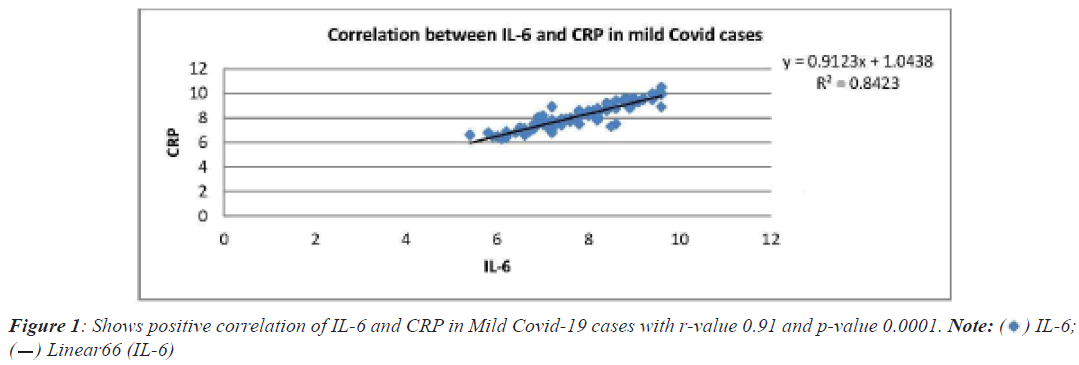


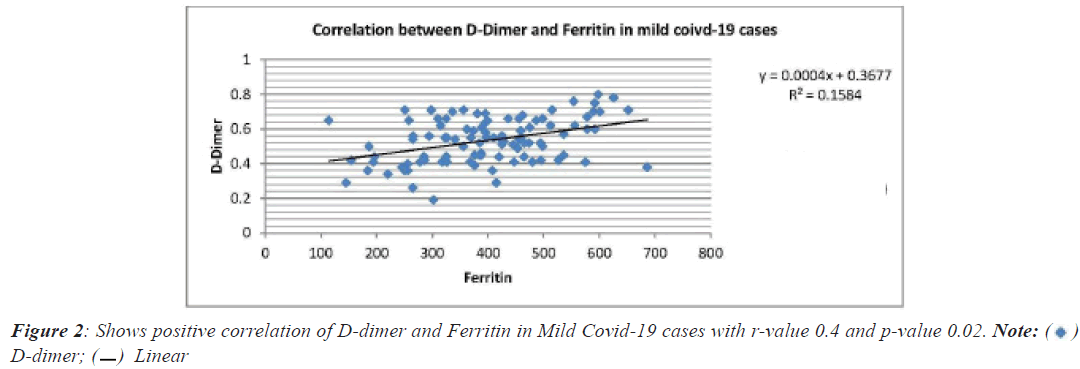


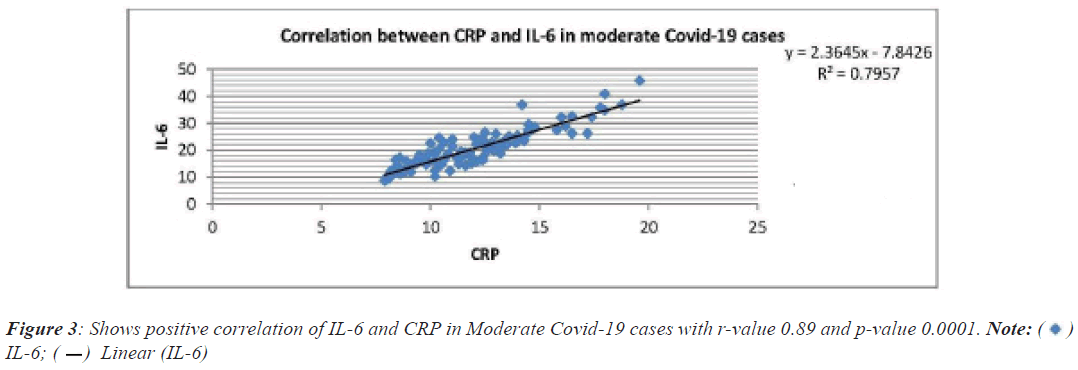


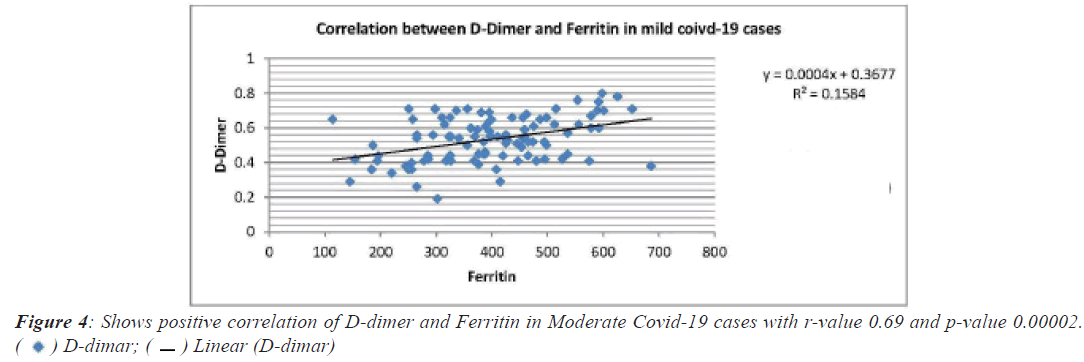

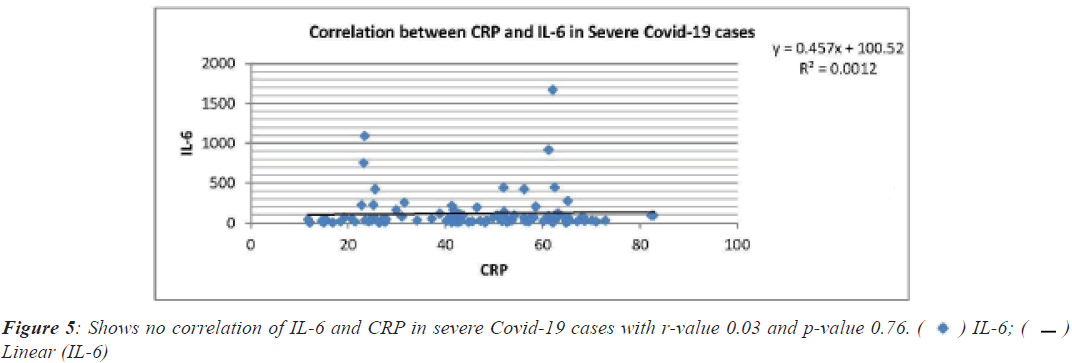
 Linear (IL-6)
Linear (IL-6)
